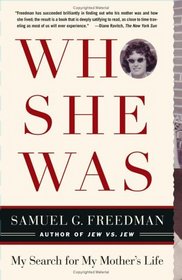Freedman's mother, Eleanor, died of cancer at age 50. Thirty years later, he has written a vivid story, her story, with all the narrative energy of a novel. She was a lovely girl, and she loved being admired. She grew up in the East Bronx, surrounded by Jewish Eastern European immigrants like her family; she had boyfriends and one bad marriage before the good one; during World War II, she basically supported her entire family and attended college. She had flash and grace. Freedman is too hard on himself for the callow undergraduate he was during his mother's dying, but most of the tale is rich in remembered conversations, postcards from the front, Yiddish sayings, and the texture of what the Jewish Bronx was like in the 1930s and 1940s. He does it with the same meticulous research skills he used in Small Victories (1990) and Jew vs. Jew (2000): a painstaking mosaic of memory, interview, document, and artifact.
Search -
Who She Was : My Search for My Mother's Life
Who She Was My Search for My Mother's Life
Author:
When Samuel G. Freedman was nearing fifty, the same age at which his mother died of breast cancer, he realized that he did not know who she was. Of course, he knew that Eleanor had been his mother, a mother he kept at an emotional distance both in life and after death. He had never thought about the entire life she lived before him, a life of he... more »
Author:
When Samuel G. Freedman was nearing fifty, the same age at which his mother died of breast cancer, he realized that he did not know who she was. Of course, he knew that Eleanor had been his mother, a mother he kept at an emotional distance both in life and after death. He had never thought about the entire life she lived before him, a life of he... more »
The Market's bargain prices are even better for Paperbackswap club members!
Retail Price: Buy New (Paperback): $16.89 (save 23%) or
Become a PBS member and pay $12.99+1 PBS book credit
![header=[] body=[Get a free book credit right now by joining the club and listing 5 books you have and are willing to share with other members!] Help icon](/images/question.gif?v=cb475be7) (save 40%)
(save 40%)ISBN-13: 9780743285117
ISBN-10: 0743285115
Publication Date: 4/4/2006
Pages: 352
Rating: 2
ISBN-10: 0743285115
Publication Date: 4/4/2006
Pages: 352
Rating: 2
4.5 stars, based on 2 ratings
Publisher: Simon Schuster
Book Type: Paperback
Other Versions: Hardcover
Members Wishing: 1
Reviews: Member | Amazon | Write a Review
Book Type: Paperback
Other Versions: Hardcover
Members Wishing: 1
Reviews: Member | Amazon | Write a Review
Please Log in to Rate these Book Reviews
Genres:
- Biographies & Memoirs >> Community & Culture >> General
- Biographies & Memoirs >> Community & Culture >> Jewish
- Biographies & Memoirs >> Historical >> General
- Biographies & Memoirs >> Specific Groups >> Women
- History >> Jewish >> General




